|
Throughout the year, the Southern New England Conference of the United Church of Christ reproduces the Daily Lectionary for use by churches. These are the suggested readings for March 31st: Psalm 126; Isaiah 43:1-7; and Philippians 2:19-24. I would encourage you to read these short selections as part of your Lenten practice.
The book of Isaiah is divided by scholars into three sections based on the analysis that there appear to be three separate “Isaiah” authors writing at three distinct times in Israel’s history. The first “Isaiah” consists of chapters 1-39 and gives evidence of being written prior to the fall of Jerusalem in 586 B.C.E. to the Babylonians. The second “Isaiah,” commonly called Deutero-Isaiah, may be found in chapters 40-55. The final “Isaiah,” Trito-Isaiah, is heard in the last ten chapters of the book. Today’s selection is drawn from Deutero-Isaiah. The unthinkable has happened, Jerusalem has fallen to foreign invaders. God’s Temple has been desecrated and destroyed. The people trusted in their designation as chosen based on their special relationship with Yahweh. This was a relationship that had a physical manifestation in the Temple Solomon had erected. The ritual taking place only in the Temple honouring God reached even further back to Aaron. And now it was gone. The faith of Israel was traumatized. They were forced to wonder if Yahweh had given-up on them. The people were sent into exile in Babylon. There they were surrounded by the powerful symbolism of another god. Their conqueror constructed one of the Seven Wonders of the World, the hanging gardens of Babylon. The perceived defeat of Yahweh and the grandeur of Marduk had to threaten the continuation of their faith. Into this gaping spiritual wound, Deutero-Isaiah opens with these words: “Comfort, O comfort my people, says your God.” The angry God of the original Isaiah who had to forewarn his people of coming destruction is now the God who offers comfort and hope. Israel in exile is not defeated. Rather, they are “a light to the nations.” (42:6) Now no longer confined to a particular plot of land they are to share their faith with all the world. Out of defeat, new life emerges: “See, the former things have come to pass, and new things I now declare.” (42:9) It is in this context that today we hear Yahweh reaffirm the personal connection that faith was always intended to build up. The Temple had become mechanical. Yahweh, in response, says to these people who are defeated, confused and frightened, “Do not fear, for I have redeemed you; I have called you by name, you are mine.” The prophet is sharing God’s reassurance, God’s comfort, that even though things seem lost and broken beyond repair, that Yahweh knows them each by name. In the Pauline selection, we can feel the personal connection at one level between founding apostle and church community, and at an even deeper level in the personal relationship between Paul and Timothy that is described as “like a son with a father.” It may be easier to grasp the personal connection in the limited context of Paul and his beloved and faithful disciple Timothy, but it is there as well in the love of Yahweh for His people: “I have called you by name, you are mine.” No matter the circumstance, the personal love of God for His people never weakens. As we close the month of March and continue forward in our Lenten journey, let us apply these readings of reassurance to the personal connection between Christ and Christian that cannot be broken even by death on a cross, that are actually strengthened by Jesus’ willingness to die rather than to forsake us. It is the personal love of Jesus for each of us that makes the cross a symbol of life not death, of victory not defeat, and of hope not despair. Let us work on our personal relationship with Jesus in these last weeks of Lent as we walk closer and closer to Golgotha. If you’d like, here is the link to the Southern New England Conference’s daily reading schedule: www.sneucc.org/lectionary.
0 Comments
Throughout the year, the Southern New England Conference of the United Church of Christ reproduces the Daily Lectionary for use by churches. These are the suggested readings for March 30th: 2 Kings 4:1-7; Psalm 53; and Luke 9:10-17. I would encourage you to read these short selections as part of your Lenten practice.
The 2 Kings and Luke selections speak of miraculous plenty. Such were signs of divine providence, drawing upon the example of the heaven-supplied manna in the desert during Israel’s 40-year Exodus. One of this past Sunday’s readings was Joshua 5:9-12. Israel had crossed over the Jordan River and entered the Promised Land, and with this it was said: “The manna ceased on the day they ate the produce of the land, and the Israelites no longer had manna; they ate the crops of the land of Canaan that year.” Stories of miraculous plenty tie in with images of heaven’s abundance. They become signs that testify to the hand of God at work in the world through a Moses, or Elisha, or Jesus. These miracles, however, are aberrations. They intrude on the natural order for a time, but they do not displace it. Elisha’s miracle is generous. He tells the widow to gather as many containers as possible “and not just a few.” When the last of these many containers is filled, the miraculous abundance ends – just as the manna had ended when Israel entered the Promised Land. The natural order again returns. Jesus’ miracle of the loaves is a heavenly sign to the massive crowd that Jesus follows in the line of such important figures as Moses and Elisha. The miracle is a welcome gift from heaven for the moment, but the next meal is not going to be provided in the same way. Rather, the miracle is the gateway for what follows. Jesus will ask immediately, “Who do the crowds say that I am?” which then is followed quickly by the next question to the disciples, “Who do you say that I am?” The miracle of the miraculous plenty was not supposed to forever transform the natural order. It was meant to transform its witnesses, especially the disciples, so that they could then be readied to make a difference in the world through their ordinary efforts. It is akin to stepping into the Promised Land. The miraculous manna ceases and Israel must now be ready to do the work of feeding itself. Jesus turns to His closest followers after the miracle of the loaves to see if they get Him, if they will be able to share with others who He is. This evening I will be the next presenter in our Lenten Discussion Series. If you’d like to join us it will take place at the Montague Congregational Church at 7PM in person. If you’d like to join online send an email to [email protected] for the login. I will be talking in part about the ordinary. Jesus asks us for fundamental, transformative change, and with this change we are able to build a better world. The miracle is not these momentary interventions, but Jesus’ abiding presence and grace that allow us – if we allow – to move beyond a childish dependence to a mature responsibility. Jesus provides everything we need to make a better tomorrow, but it’s up to us to follow through. When we look at the crucified Jesus, it is hard to ask always for more. Miracles happen, but lasting change is made possible when faith happens. If you’d like, here is the link to the Southern New England Conference’s daily reading schedule: www.sneucc.org/lectionary. Throughout the year, the Southern New England Conference of the United Church of Christ reproduces the Daily Lectionary for use by churches. These are the suggested readings for March 29th: Leviticus 25:1-19; Psalm 53; and Revelation 19:9-10. I would encourage you to read these short selections as part of your Lenten practice.
Lent is a time of introspection. It asks us to step closer to the cross and to look up at the crucified Saviour. What changes, if anything, within us as we consider the horrible and public suffering of Jesus, of God? We are confronted daily with images of the suffering people of Ukraine. Those images draw out a response in us. People react differently to them, but people react. Do we react to Jesus’ suffering? This is what Lent’s introspection asks. Do we respond to the scandal of the cross? Does it challenge us? Would we allow it to change us? Sometimes we view the strength of faith by its consistency and regularity. Sometimes, though, should we look to faith as an incitement to change, maybe even radical change? I was reading an article the other day about a group of women in Stoneham, MA in the mid-19th century. They were vocal abolitionists. They would no longer submit to the prevailing notion that the Black race was inferior, basically subhuman, and this was a notion subscribed to by many in the North not only the South. They spoke out so courageously that the church responded: “In July of that year [1837], a pastoral letter from the General Association of Congregational Churches had been read from the pulpit in churches throughout Massachusetts. The letter called on women to refrain from public discourse. It was a response to growing concern over [the women] who had been lecturing in New England on the evils of slavery. The first problem was their sex. Women, the ministers wrote, should not try to displace men as the appointed teachers of morality. … The message to women across the Commonwealth was clear: Keep quiet about slavery.” (Boston Globe, 3/20/22, p. K8) The religious leaders and institution sought to maintain the status quo as part of practicing the faith. They sought to silence the consciences of the women who saw slavery [and women’s suffrage] as a great immorality and as thoroughly unchristian. Their faith pushed them to fight against the established faith. Their faith challenged them to change the established faith. In today’s reading from Revelation, we share a passage that lifts-up Christian prophecy. We are familiar with Old Testament prophets, but sometimes the idea of Christian prophecy in the New Testament comes as a surprise. The prophetic author of Revelation shares the voice of an angelic messenger who states, “‘For the testimony of Jesus is the spirit of prophecy.’” This is the teaching of the living Word of God, that Jesus continues to speak through the Spirit. Prophecy is dangerous to institution, even religious institution. The women of Stoneham were speaking prophetically, and the leaders of the church resisted. The leaders saw their job to maintain what was. The women saw their job as to build what will be. They spoke prophetically; they spoke “the testimony of Jesus.” Or look at the reading from Leviticus. It speaks of the Year of Jubilee. I have never heard a biblical fundamentalist preach this old-time-religion message. Every 50th year, says the Bible, wealth is to be redistributed. The Bible preaches against the amassing of huge wealth disparities. People will do well for themselves and others will hit hard times, but on the Year of Jubilee the wealthy return what they have received and wealth disparity is erased. There are obvious practical difficulties with the Year of Jubilee, but its message can be honoured. Or, is this biblically explicit reading to be ignored while we choose to quote other ones that fit our social and economic preferences? Do we maintain the status quo rather than allowing the faith to challenge us? The cross flabbergasted the earliest followers of Jesus. They struggled to find meaning in it. They were forced to react to it, to respond to it, to be challenged by it, to even be changed by it. An unchanging faith or one that chooses to listen selectively is not the faith of the cross, the scandalous, unexpected cross. During this season of the cross, let us try to find the time to look inward as we look upward at the crucified Saviour for the good of our faith. If you’d like, here is the link to the Southern New England Conference’s daily reading schedule: www.sneucc.org/lectionary. Throughout the year, the Southern New England Conference of the United Church of Christ reproduces the Daily Lectionary for use by churches. These are the suggested readings for March 28th: Leviticus 23:26-41; Psalm 53; and Revelation 19:1-8. I would encourage you to read these short selections as part of your Lenten practice.
I attended Brandeis University as an undergraduate. It was a great experience in many ways. One of which was my exposure to a lively Jewish faith. Brandeis was born as a sectarian Jewish college after World War II. It continues to have a large and active Jewish presence on campus. It was good for me to experience this academic and religious culture as a young person because I had led a sheltered life in suburban Western Massachusetts. The only person of a Jewish faith I can remember from my youth was my dentist. While at Brandeis, I was invited to attend different Jewish Services from various branches of Judaism. It ranged from an Orthodox Service where the men and women were separated and much was in Hebrew to a Conservative Service that invited everyone to intermingle and was rather informal. I also witnessed the mass participation of the Jewish students in the practice of their Holy Day traditions, two of which are laid out in today’s Leviticus reading. The Day of Atonement, Yom Kippur, I liken to our Good Friday. It is an extremely solemn and somber day. Many of the ones I knew were not particularly observant on a regular basis, but on the Day of Atonement they practiced the ritual of their faith. Many would not even turn on a light in their dorm rooms. The lights needed to be turned on before the Day of Atonement because even to flip the switch was judged an act of work and all work is forbidden on this sacred day. The other tradition is the Feast of Booths, Succoth. Temporary booths were constructed around campus of branches and the such. The students observing Succoth would share in their meals together for a week outdoors in these temporary structures. I remember it being rather chilly outside during this Fall festival, but they continued to practice the tenets of their faith, a faith that reached back over 3,000 years. I once took the students of a Confirmation class to the home of friends who are Jewish. They were kind enough to invite us into their Sukkot and to share both their food and their tradition with us. Ken and Jane were proud of their faith and excited to share it. The ritual of faith-lives is important. It connects us with each other, with the supernatural and with a tradition that links generations together through time. You may sometimes hear the workings of church ritual called liturgy. This word is derived from the combination of two Greek words that mean work of the people. The Book of Revelation assumes that liturgy continues to be the work of the people even in heaven. Whether this is literal or not is not as important as the message that the significance of ritual is not bound to this world and this particular time. Through ritual we break through and connect with God’s realm. In prayer we reach out to God. In ritual, in the gathering of the community at worship, God comes to us. Remember what Jesus said: “‘For where two or three are gathered in my name, I am there among them.’” (Matthew 18:20) This is why the congregation in Congregationalism is so important to our lives of faith. There is no competition between private acts of worship done in whatever way feels meaningful and the congregation’s communal worship. They do not compete; they cooperate. The life of the church is made richer by the vibrant spiritual lives of its members, and the private spiritual lives of its members are made richer by the church at worship. I hope that during Lent both have been inspiring for us. I hope that both have brought us to a deeper appreciation of our crucified Saviour. And as there is only one Sunday between us and Holy Week, I pray that we will be able to worship together during these holiest days of our church year. Please know that each of us at church has an effect on everyone else at church, whether in person or online. We enter into that continuity of ritual that reaches back to the ancient Israelites and forward all the way to heaven’s eternity. The worship of the church is never understood for all its glory as obligation. It is a privilege and a blessing. And I look forward to sharing in it with you. If you’d like, here is the link to the Southern New England Conference’s daily reading schedule: www.sneucc.org/lectionary. Throughout the year, the Southern New England Conference of the United Church of Christ reproduces the Daily Lectionary for use by churches. These are the suggested readings for March 26th: Exodus 32:7-14; Psalm 32; and Luke 15:1-10. I would encourage you to read these short selections as part of your Lenten practice.
This makes no sense. And that’s the point. Jesus’ parables draw on shared experiences to make the gospel resonate. The people who are listening to Jesus would know about shepherding. They may not own 100 sheep, but they can ramp-up their own experience and put themselves in the shoes of the shepherd in the story who lost one sheep. When you go looking for clipart to illustrate this parable, they always have an adorable picture of Jesus, the shepherd, finding and rescuing that one lost sheep. It has been a popular Christian art theme for as long as there have been Christians. This is all well and good except for the fact that Jesus’ listeners would have been wondering what happened to the other 99. The shepherd does not leave the 99 in a protective corral or under the care of an associate. Rather, the 99 are left to wander without protection in the wilderness. This would seem to be a recipe for disaster. The unprotected 99 are vulnerable to predators, and just as the one got lost, so could any number of these 99 left on their own in the wilderness. Such possibilities must have jumped out as the people heard Jesus speak. It simply would not be practical to leave the 99 in a precarious situation in order to save the one. When Jesus asks, “‘Which one of you, having a hundred sheep and losing one of them, does not leave the ninety-nine in the wilderness and go after the one that is lost until he finds it?’” it is quite possible that no one would have agreed with this assessment. It simply makes no practical sense. And that’s the point. Religious leaders, we are told, have scoffed at Jesus’ religious credentials because “‘This fellow welcomes sinners and eats with them.’” If Jesus were a true religious teacher, then He would spend His time and exert His efforts among those who are worthy of such things, but Jesus associates with throw-away people. This is the setting for the parable of the one lost sheep. The religious authorities are ridiculing Jesus because sinners have found in Jesus divine compassion and understanding. The sinners are throw-away people to the religious authorities. They are the lost sheep not worth the effort to retrieve. Stick to the practical: worry only about the 99. Jesus is wasting His time. The logic of focusing on the 99 would have made practical sense to everyone in the crowd around Jesus. They may even have gone home later and still mulled over this silliness of the one lost sheep. They would laugh about how preposterous this was. The power of Jesus’ parables is that they got people to thinking. It’s like one of those ear-worm songs that you can’t stop returning to no matter how hard you try. I remember taking my daughters to FAO Schwarz and hearing “Welcome to our world.” I couldn’t get it out of my head. I wondered how in the world the employees at that store could stand it. And the more the people around Jesus thought about this short little parable, maybe they started to think that Jesus knew it made no sense. How could He not? And maybe they got to thinking that the love of God is so much more than practical and logical. Maybe the authorities are satisfied with the idea of throw-away people, but maybe the God of Jesus’ gospel doesn’t accept such logic. Maybe Jesus is revealing a God whose love is above calculations of how good or how bad, and maybe God loves because God is love and God can do nothing less than love. (1 John 4:16) This sort of love makes the cross more logical – not human logic, but divine logic. And this is the God we meet in tomorrow’s Gospel parable, the most amazing parable of all I believe, the parable of the Prodigal Son. In so few words, Jesus reveals so very much. If you would like to join us for worship tomorrow, saint or sinner we don’t care because God doesn’t care, please know we’d love to see you. You can join us in person or if you feel more comfortable you can join us online. Drop an email to [email protected] for the login. If you’d like, here is the link to the Southern New England Conference’s daily reading schedule: www.sneucc.org/lectionary. Throughout the year, the Southern New England Conference of the United Church of Christ reproduces the Daily Lectionary for use by churches. These are the suggested readings for March 25th: Joshua 4:14-24; Psalm 32; and 2 Corinthians 5:6-15. I would encourage you to read these short selections as part of your Lenten practice.
Today is the fourth Lenten Friday. During an especially solemn and meaningful season, Lenten Fridays are even more focused on the image of Jesus crucified. If we were to count nine months into the future, it would be Christmas Day. Do you remember how we rejoice at the birth of the Holy Infant conceived by Mary? How we wonder at the thought of God entering our world in such innocence and humility, and such human ordinariness? That is the same child who we remember crucified on Good Friday. On Christmas we celebrate and find hope in God entering our world as one of us and for us. On Good Friday, it is that same child now grown to adulthood who suffers and dies on the cross as one of us and for us. On Christmas, we do not seem to have objections to imagining the halo shining bright over the Bethlehem manger. On Good Friday, that same light is there shining on the cross as God in Christ endures human suffering and death. A couple of evenings ago I watched parts of the confirmation hearing of Supreme Court nominee Ketanji Brown Jackson. I have saved and shared the amazing words of Sen. Cory Booker in defense of Judge Jackson. They were powerful and sincere. They brought the judge to tears. Even if I could ever be as eloquent as Sen. Booker, I could never say what he said. I could never share what he shared, feel what he felt. His words came from his shared experience with Judge Jackson of being a Black person. The tears rolling down Judge Jackson’s cheeks came from knowing what the Senator knows because both are Black. Judge Jackson, at her confirmation hearing, shared the story of walking through Harvard Yard as a young, Black woman. Walking toward her was another Black woman. This other woman was a stranger, but she recognized the look on Ketanji Brown Jackson’s face. As they passed each other, the stranger, the other Black woman, leaned in and only said, “Persevere.” The other woman, an older, Black woman, saw in Ms. Jackson’s face the same look she must have had years earlier on coming to Harvard and wondering if she didn’t belong. That one word “persevere,” from someone who looked like her, gave Ketanji Brown Jackson the courage to continue, and soon she will be named the next Justice of the Supreme Court. The connection between Judge Jackson and Sen. Booker and that unknown woman at Harvard was what made what they said so meaningful. They shared a common experience that goes in two directions. I can watch as this happens, but I can’t join fully in their shared experience because it has not been my experience. In Jesus, from Bethlehem to Golgotha, God has lived as us, has shared our experience as human beings. In Jesus, we now have a connection with God that goes in two directions. In Jesus, God understands us, and we can look back at God in Jesus and understand God. This two-way street is what allows Paul to say today, “And [Jesus] died for all, so that those who live might live no longer for themselves, but for him who died and was raised for them.” As we look to Jesus on the cross during Lent, we can see clearly that now God understands human suffering because God has suffered as a human, but we should also see in the cross Jesus’ example for all of us on how we are to live. Jesus gives us His last, perfect gospel-teaching on the cross that we must strive to no longer live only for ourselves. Jesus’ death saves us be showing us how to live. If you’d like, here is the link to the Southern New England Conference’s daily reading schedule: www.sneucc.org/lectionary. The Youth Group Spring Flower Sale is ongoing. Orders need to be received by April 24th. Pick up will take place outside the church on Saturday, May 7th. Order forms may be picked-up at church on Sundays or by emailing [email protected]. And thank you.
For larger print text or to download, click the PDF file below.
Throughout the year, the Southern New England Conference of the United Church of Christ reproduces the Daily Lectionary for use by churches. These are the suggested readings for March 24th: Joshua 4:1-13; Psalm 32; and 2 Corinthians 4:16—5:5. I would encourage you to read these short selections as part of your Lenten practice.
Joshua leads the twelve tribes of Israel across the Jordan River. The people of Israel enter the Promised Land at Gilgal. There they set up a memorial monument. The monument is said to consist of twelve stones from the riverbed of the Jordan River. Twelve men, one from each of Israel’s tribes, carry out one stone each “on his shoulder.” Even if these were the twelve strongest men in Israel, the memorial monument would not be monumental. As a matter of fact, the location of Gilgal has been lost to history. Much takes place at Gilgal. The name appears 41 times in Scripture, but this once important site has been lost to history. Paul worked as a tentmaker. This is how he paid his expenses as he traveled throughout the Roman Empire preaching about Jesus and establishing church communities. These two endeavours intertwine in today’s 2 Corinthians’ passage. The tent becomes a symbol of the transitory for Paul. It serves its purpose well, but its purpose is not permanent. The tent is intended for temporary shelter. Our physical bodies, says Paul, are our earthly tents. They serve us in the world, but our time in the world is limited. We are mortal creatures. Death is an unavoidable part of life. I remember being at a Youth Retreat years back. I spent the week in a tent with two other counselors. I was grateful for the tent while trying to survive in the wilds of 4-H Camp Howe in Goshen, but I would not want to remain in that tent any longer than I needed. I was so happy to return home and sleep in my bed. Likewise, Paul contrasts the earthly tents of our bodies with the spiritual lives we will share with Christ in heaven. He writes: “… a building from God, a house not made with hands, eternal in the heavens.” The tents of our bodies are blessings, but they are temporary. Paul is pushing us to invest ourselves while living in these tents to anticipate our eternal dwellings, saying, “… for what can be seen is temporary, but what cannot be seen is eternal.” This only makes sense by trust, by faith. Those who cannot trust or believe in the unseen eternal cannot make this investment. And I actually get that. The unseen eternal can seem to many to be no different than any other make-believe tale. But the thing about faith is that it doesn’t live in the past – Gilgal is lost to history, and it doesn’t abide in the future – the unseen eternal. It lives in the present. The past can give a foundation to faith and the future offers hope to faith, but faith lives in the present. Faith needs to be real now. Faith cannot be merely the recollection of someone else’s faith nor the prospect of an unseen future. Faith abides with us and among us here and now. Lent calls us to make faith a living connection with Jesus. It gives us the time and opportunity to build a strong living relationship with Christ. And it is the faith alive in the present that is moved by the love of the cross on Golgotha and comforted by the hope of the empty tomb. Let’s, therefore, take advantage of every Lenten moment. If you’d like, here is the link to the Southern New England Conference’s daily reading schedule: www.sneucc.org/lectionary. |
NewsFaith, love and chitchat. Categories
All
Archives
June 2024
Follow
|
||||||
|
SERVICE TIMES
Sunday 9:30-10:30am Children Sunday School 9:30-10:30am Nursery care available during worship DONATE Make a single or recurring contribution by clicking here |
FOLLOW
|


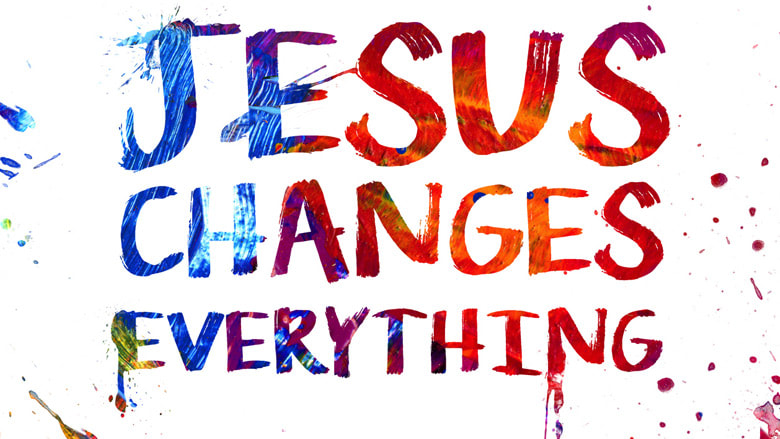
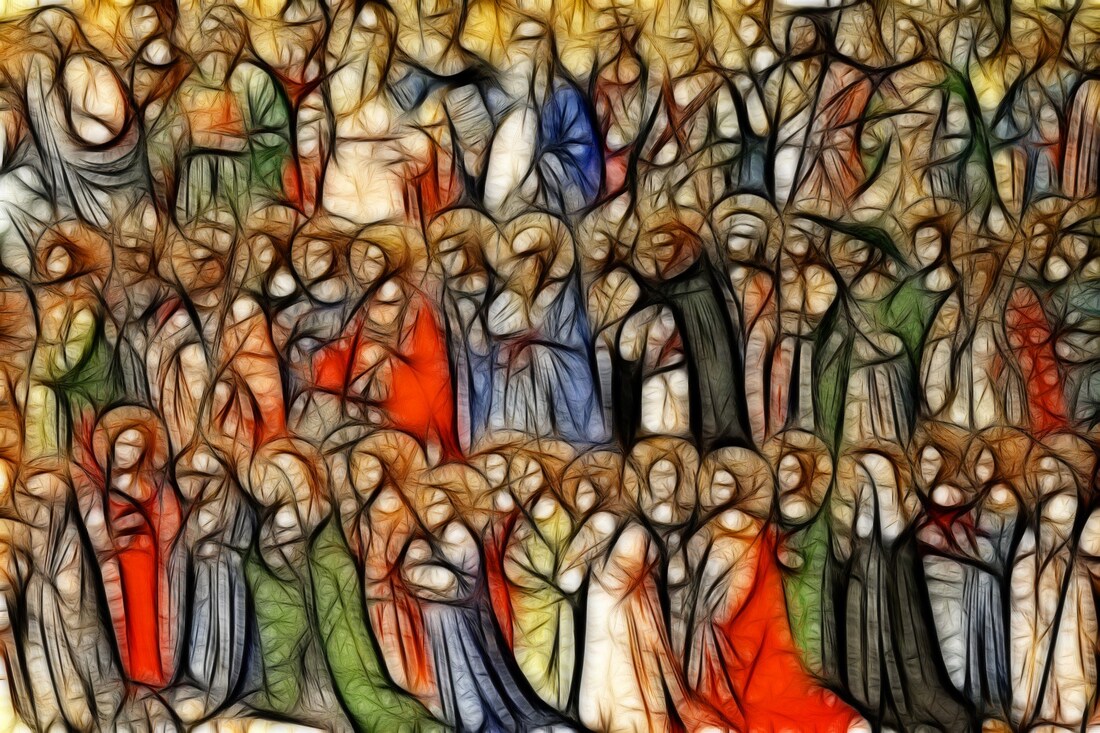
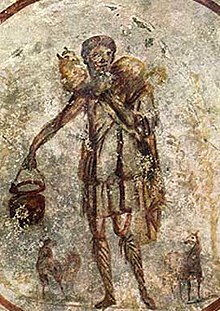


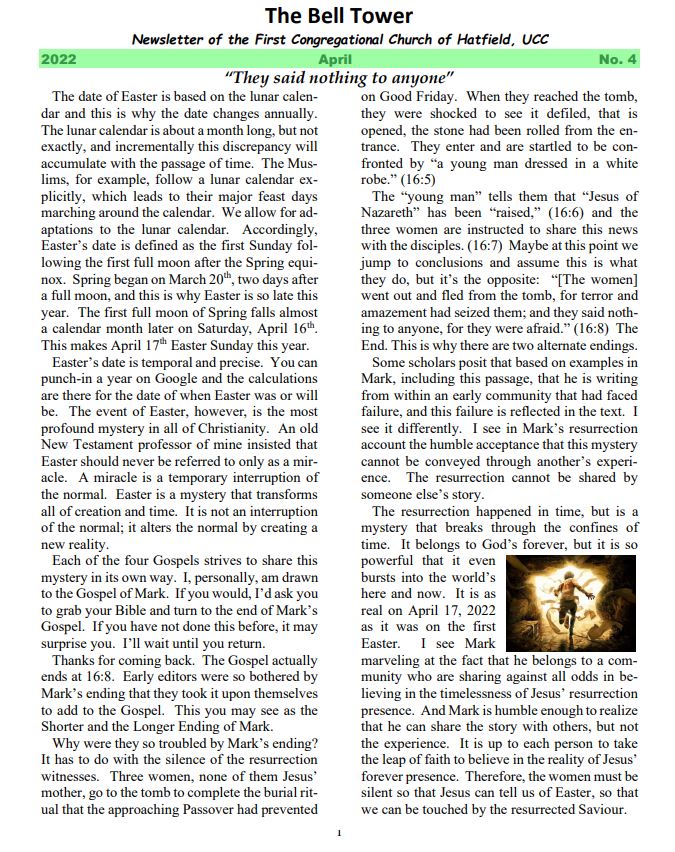
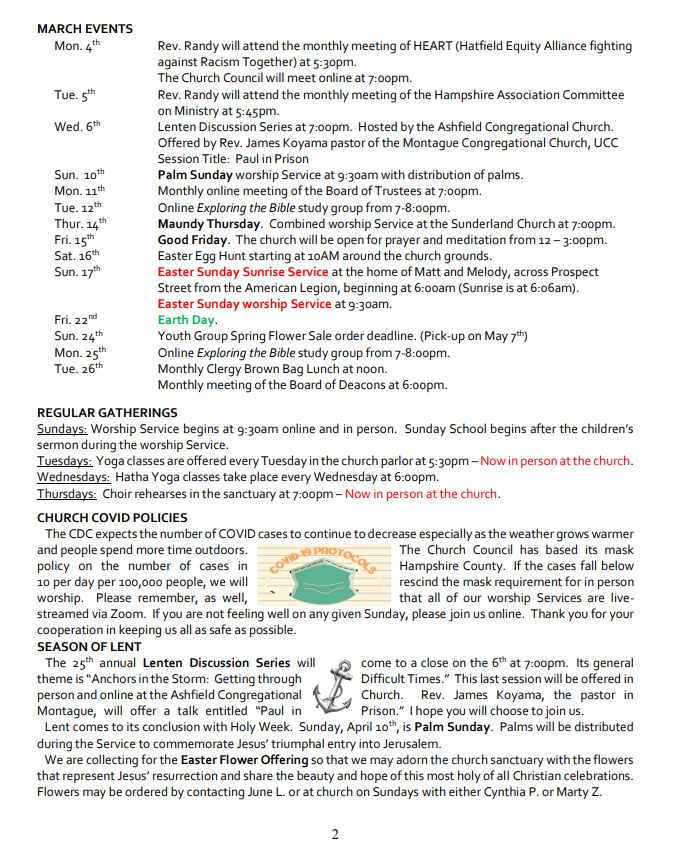
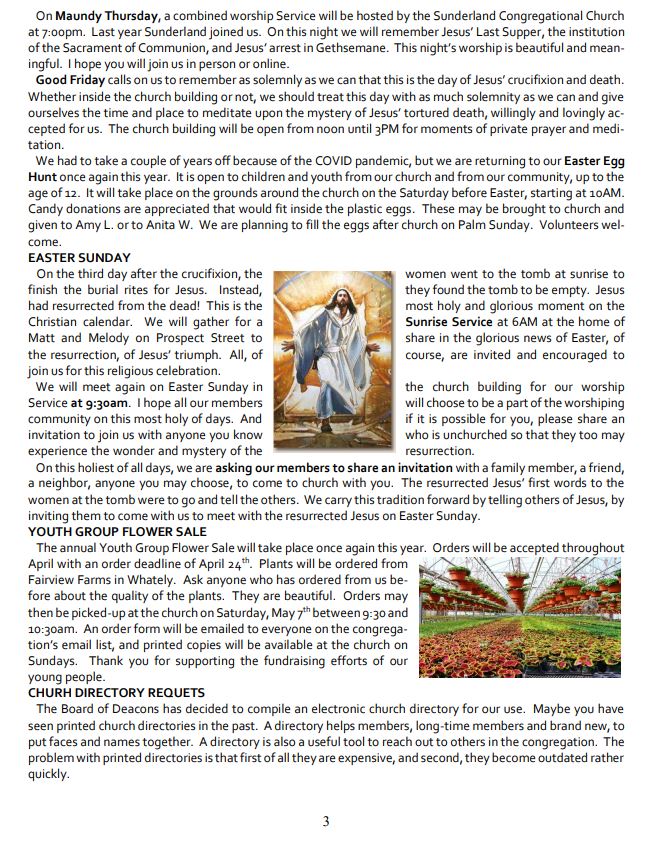
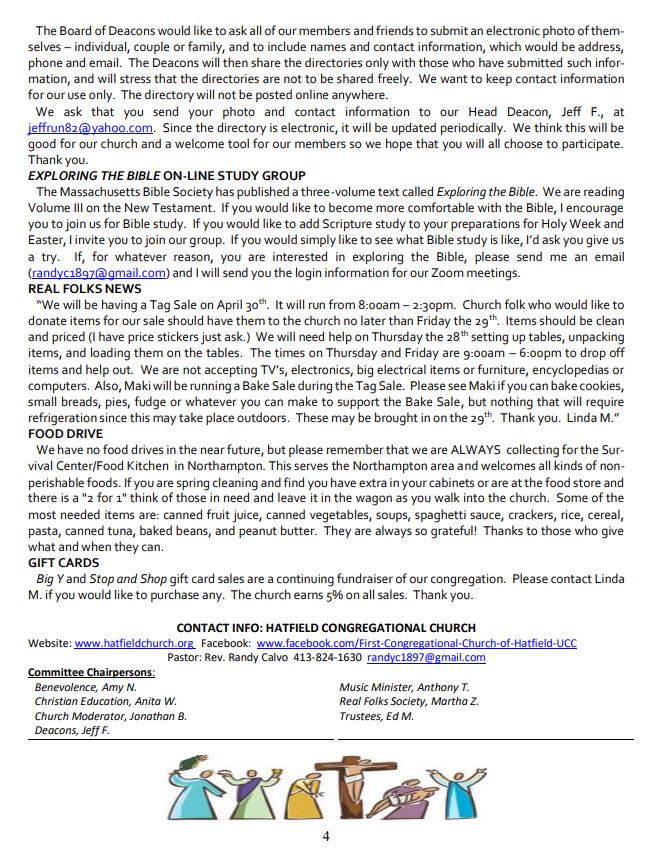

 RSS Feed
RSS Feed
